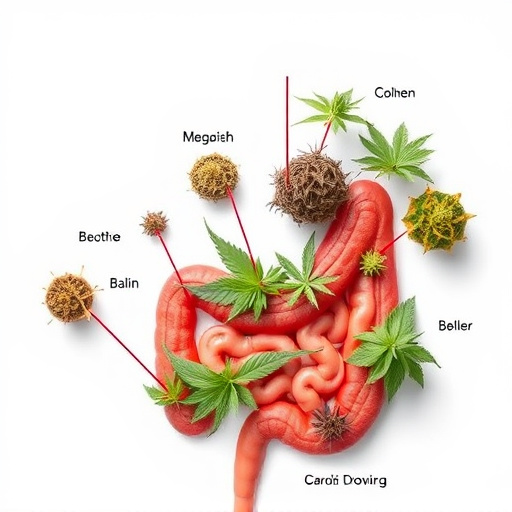Cannabis, with key compounds THC and CBD, offers natural relief for Crohn's Disease symptoms like abdominal pain, inflammation, and diarrhea. Strains high in CBD or balanced THC-CBD ratios manage inflammation without intoxication. Indica strains relax muscles, while Sativa strains provide energy. Integrating cannabis into a treatment plan, under healthcare provider supervision, combines conventional drugs with anti-inflammatory cannabis properties for comprehensive symptom management.
“Unraveling the potential of THC and CBD in pain management, this article explores their unique roles in alleviating chronic discomfort. From understanding the interplay of these cannabinoids with the endocannabinoid system, to investigating specific cannabis strains effective for Crohn’s Disease, we delve into targeted approaches. Additionally, we discuss how to seamlessly integrate cannabis as part of a comprehensive treatment plan. By exploring these avenues, individuals can navigate alternative solutions and find relief.”
- Understanding THC and CBD in Pain Management
- Cannabis Strains for Crohn's Disease: A Targeted Approach
- Integrating Cannabis into a Comprehensive Treatment Plan
Understanding THC and CBD in Pain Management

Cannabis has gained attention for its potential in managing pain, especially as an alternative or adjunct to traditional medications. Two key compounds, THC (Tetrahydrocannabinol) and CBD (Cannabidiol), have sparked interest in the medical community due to their unique interaction with the body’s endocannabinoid system, which plays a role in regulating pain perception and inflammation.
For conditions like Crohn’s disease, which often involves chronic inflammation and pain, certain cannabis strains are believed to offer relief. THC, known for its psychoactive effects, can help manage pain by binding to cannabinoid receptors in the brain and body, potentially reducing discomfort. CBD, on the other hand, doesn’t produce a high but has shown promise in mitigating pain and inflammation without the mind-altering effects. Research suggests that specific cannabis strains high in CBD or balanced THC-CBD ratios may be beneficial for Crohn’s disease patients, offering a natural approach to managing symptoms and improving quality of life.
Cannabis Strains for Crohn's Disease: A Targeted Approach

Cannabis has emerged as a promising treatment option for various conditions, including Crohn’s Disease, an inflammatory bowel disorder. Specific cannabis strains for Crohn’s disease are tailored to provide targeted relief from symptoms such as abdominal pain, inflammation, and diarrhea. These strains often contain high levels of Cannabidiol (CBD) and Tetrahydrocannabinol (THC), the primary compounds known for their therapeutic effects.
While THC is renowned for its psychoactive properties, CBD offers anti-inflammatory benefits without inducing intoxication. Certain cannabis strains with a high CBD-to-THC ratio are particularly effective in managing Crohn’s Disease. For instance, strains like Charlotte’s Web or ACMD (American Cannabidionol Medical Association) recommended varieties often fall into this category. These strains can help reduce inflammation and potentially slow down the progression of the disease, offering a natural approach to symptom management for patients dealing with Crohn’s.
Integrating Cannabis into a Comprehensive Treatment Plan

Integrating cannabis into a comprehensive treatment plan can offer significant relief for chronic pain, especially for conditions like Crohn’s disease. While THC and CBD are the most well-known compounds in cannabis, it’s crucial to understand that different strains have varying levels of these chemicals. For instance, Indica strains are often preferred for their sedative effects, which can help relax muscles and promote better sleep, common challenges faced by those with Crohn’s. On the other hand, Sativa strains may provide more energy and focus, aiding in daily activities despite pain.
A well-rounded approach involves combining cannabis use with traditional medical treatments. For instance, patients with Crohn’s disease might benefit from anti-inflammatory medications alongside specific cannabis strains known for their anti-inflammatory properties. This integration requires close monitoring by healthcare providers to tailor the treatment plan to individual needs and ensure safety and effectiveness.
In conclusion, both THC and CBD have shown promise in pain management, with specific cannabis strains offering targeted relief for conditions like Crohn’s disease. Integrating cannabis into a comprehensive treatment plan can provide a holistic approach to managing pain, offering alternative solutions alongside conventional methods. For individuals seeking natural remedies, exploring these compounds and their potential benefits is a step towards improved well-being, especially when tailored to specific needs, such as the unique case of Crohn’s disease.














